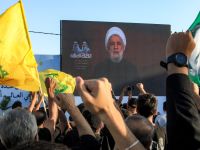Decades of overwhelming military superiority in the Middle East have made Israel wary of upstarts, and recent US refusals to share information on its arms sales to Egypt have set off alarm bells at the regional superpower.
Israel enjoys "nuclear capabilities, perceived chemical warfare capabilities...and domestic production of home-grown, hi-tech military developments," according to Tony Banks, the former political editor for Jane's Defence Weekly.
Despite these adavantages, Israeli defense officials are asking why the US refuses to share with Israel information about the arms it is supplying to Egypt. For now, military intelligence labels Egypt a danger, but not a threat, according to a report by Haaretz.
The paper said Sunday that a dispute-ridden debate about Egypt's real intentions toward Israel was currently preoccupying Israel's intelligence community.
On the right, ministers Avigdor Lieberman and Uzi Landau, and MK Yuval Steinitz, chairman of the Knesset subcommittee of the foreign affairs and defense committee, attribute hawkish motives to Egypt, said Haaretz.
Lieberman has called Egypt an “enemy state," amid reports on an Egypt missile program in the Western and Israeli media, and Egyptian military exercises in the Sinai Peninsula.
The report said the debate also echoed in the Pentagon and the US State Department, where the focus was mainly on American arms shipped to Egypt.
The weaponry that the United States supplies to the Israeli military as "arms to preserves Israel's qualitative edge" will eventually be supplied to Egypt as well, according to the report.
Israelis are asking why Egypt needs such extensive weaponry, said the Haaretz report, which did not address the huge regional imbalance created by Israel's own enormous military budget and immense stockpile of nuclear weapons.
According to a report by the Federation of Americn Scientists, arms will be the price of any future peace deals involving Israel: when an agreement with Syria was under discussion, Israel floated a $17 billion wish list before the US.
The director of Middle East studies at the US Army War College told the US press at the time that if these software codes, cruise missiles, advanced surveillance systems, and smart bombs were provided to Israel in exchange for a deal with Syria, “You trigger an arms race unwittingly. You cannot expect to arm to the teeth one nation in the region and expect all others to accept it willingly.”
Nevertheless, successive Israeli prime ministers Benjamin Netanyahu, Ehud Barak and Ariel Sharon each individually argued to the United States that the sales of arms to Egypt pose a danger to Israel.
This month, news of a planned deal to sell North Korean No-Dong surface-to-surface missiles to Egypt became public. A senior Israeli security source said this week, "The Americans will worry about this deal; we are more concerned by other missile transactions, between the Americans and Egypt."
Egypt has categorically denied it has such plans to acquire the Korean missiles, while the US State Department has said it has received “satisfactory answers,” from Cairo that make it believe that the missile program is “within acceptable limits.”
According to the Haaretz report, the Israeli defense establishment recently expressed its concerns to the US about the approval given to sell Egypt Harpoon missiles, which can be launched from ships and jet fighters, Standard missiles launched from ships, and especially a package of Patriot missiles. The Israeli Air Force views this as a significant upgrading of Egypt's anti-aircraft defense system.
According to the report, the US claims that the arms it supplies to Egypt are intended for defense or deterrence. But Israel is worried about the American response. The United States has made it clear that has no interest in sharing information with Israel about the military aid it supplies to Egypt, according to Haaretz.
This position, along with the American insistence on equipping Egypt with advanced weaponry, is indicative of the strategic importance the United States attributes to Egypt, said the paper.
Defense Minister Benjamin Ben Eliezer was quoted in the report regarding the Bush administration's "two interests in the Middle East: to strengthen Israel as an element that maintains stability in the Middle East and to maintain stability in Saudi Arabia."
Ben Eliezer says that although he is concerned about the growing strength of Egypt's army, in his view "it has not yet ripened."
A few months ago, the chief of Egypt's general intelligence service, Omar Suleiman, arrived in Israel on a secret visit. Suleiman, 63, is viewed as a possible candidate to succeed Hosni Mubarak. He was expected to replace the former foreign minister Amr Moussa, who became in April the chief of the Arab League.
According to the paper, Suleiman met with Ben Eliezer to discuss the Palestinian issue and the possibility of advancing the peace process with Syria.
According to the paper, Israel and Egypt see eye to eye on at least two very important subjects: the war on terrorism and the threat of Islamic fundamentalism.
ANALYST: EGYPT PROBABLY LYING TO THE WORLD
The right-leaning Ariel Center for Policy Research (ACPR) represents the view that attributes belligerent intentions to Egypt.
In an analysis quoted by Haaretz, Major Shawn Pine, a US Army reserves specialist in counterintelligence claims that that Egypt is involved in deceiving, if not outright lying, to the world about its annual defense budget.
According to the US Central Intelligence Agency, Egypt spends $2.7 billion annually on defense (about 8.2 percent of its annual budget).
Pine claims that Egypt's real defense expenditures are closer to $20 billion, or seven times greater than what Israel and the United States have been led to believe.
Surprisingly, continued the daily, Hillel Frisch of Bar-Ilan University does not completely reject Pine's claims. He believes that the truth is somewhere in the middle. MK Steinitz estimates the increase in Egypt's defense expenditures in real terms at 15 to 25 percent per year since the 1990s. All this happened alongside two processes: the Oslo agreements and a considerable decrease in Israel's defense budget in the 1990s.
Nevertheless, the gap between Egypt and Israel, in military terms, remains enormous. Egypt has nothing like Israel's nuclear arsenal, and in terms of conventional weapons, Israel - considered by some analysts to have the world's fourth-strongest army - maintains a huge advantage.
Meanwhile, due to the high probability of regional deterioration and concern for the future, Israeli military intelligence has updated its assessments of Egyptian intentions and strengthening of its army: "Egypt today is a danger, but not a threat."
However, Steinitz rejects military intelligence assessments. "To view Egypt as merely a danger is a farce. Egypt is a threat. It is preparing for possible war against Israel."
But the report says that if Israel is not afraid of today, tomorrow might carry bad news, especially because they have little idea about who the successor to Mubarak might be.
Haaretz’s report belongs in the context of reports on Egypt’s military capabilities and human rights abuses, which have made headlines since Egypt declared its backing for the Palestinians' latest uprising against 34 years of Israeli occupation.
President Mubarak warned in an interview with Israel’s Channel 2 TV earlier this year that spreading rumors and stepping up the rhetoric against his country, including threats to attack Egypt by right-wing Israeli officials, would lead only to more anti-Israeli sentiments among his people.
Egypt, which has reiterated that it will respect its 1979 peace treaty with Israel, still refuses to send a new ambassador to Tel Aviv since withdrawing Mohammad Bassiouni in October in protest of “Israel’s excessive use of force” to quell the Intifada. – Albawaba.com
© 2001 Al Bawaba (www.albawaba.com)









